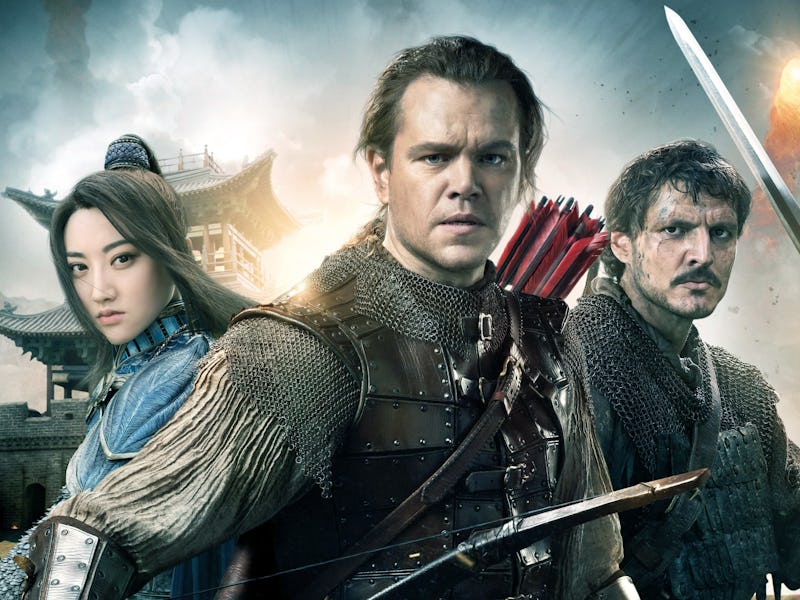7 Chinese Cinematic Epics to Watch Before 'The Great Wall'
Unsure about where to start checking out big-screen Chinese spectacles? We've got you covered.

This weekend, director Zhan Yimou’s The Great Wall burst into American theaters. The Chinese period epic stars Matt Damon as a mercenary who must lead soldiers guarding the Great Wall of China against a horde of fantastical monsters. It’s the most high-profile attempt to date of a Chinese-financed film trying to break through the American box office. Plenty of Hollywood blockbusters do crazy amounts of business in what is now the second-biggest movie marketplace in the world. But the opposite rarely happens.
So to ease you into the big-screen global spectacle, here are a handful of Chinese epics to watch before The Great Wall.
7. A Touch of Zen
The grandfather of all big-budget contemporary Chinese cinema, King Hu’s A Touch of Zen is a throwback wuxia dream. The epic spiritual quest focuses on Yang (Hsu Feng) a fugitive noblewoman who goes into exile in a small village but whose identity is uncovered by a rogue swordsman. Cue: Yang and a few fellow travelers fending off hordes of sword-wielding bad guys.
While the movie preceded the scale of historical dramas that came after it, A Touch of Zen is also kind of bittersweet. The Hollywood influence on Chinese cinema guarantees they won’t make them like this anymore.
6. Curse of the Golden Flower
Zhang Yimou is right at home telling melodramatic stories about emperors, princesses, and hundreds of thousand of loyal troops willing to do their bidding. The operative word here is “extravagance,” and for the most part, Zhang knows what to do with it.
Set during the Tang Dynasty in 928 A.D., the movie luxuriates in the Shakespearean machinations of a brutish ruler (Chow Yun-Fat) attempting to undermine his taciturn yet cunning wife (Gong Li). The backstabbing would be soap opera-worthy if it weren’t for the assured scope of Zhang’s excess.
5. Red Cliff
Following a series of Hollywood films in the mid- to late-1990s like Face/Off and Mission: Impossible II, John Woo returned to his homeland to direct this historical drama. Starring Hong Kong idol Tony Leung, it was Woo’s first Chinese-language film since bona fide action classic Hard Boiled in 1992 (also starring Leung).
The movie essentially uses the crumbling of the third-century Han Dynasty as a backdrop for Woo’s signature brand of visceral, spectacular choreography. With a nearly five-hour runtime, Woo revels in the simple premise of an outnumbered group of good guys stopping at nothing to defeat a drastically larger force of bad guys. Whether he’s filming a cop shooting a gun or an ancient warrior swinging a sword, Woo’s work remains unrivaled but highly influential.
4. Crouching Tiger, Hidden Dragon
No film better represents the contemporary bridge between the Chinese and American entertainment industries than Ang Lee’s 2000 kung fu drama. As one of the most influential foreign language films ever made, the international success of Crouching Tiger, Hidden Dragon had a long-term effect on Hollywood.
It boosted the popularity of a handful of aspects of Chinese cinema, like how the little known wuxia genre became a sudden action touchstone. It also opened the door for Chinese and Asian actors to appear in more Hollywood projects in general.
3. Monster Hunt
Raman Hui’s 2016 fable about a lowly peasant befriending a benevolent vegetable monster in a fictional ancient China became the highest grossing film in the country’s history at the time.
The peasant’s martial arts-riddled, musical quest to protect the little veggie sprout became popular by mixing adult humor and cuddly animated designs. The absurd premise made for expensive four-quadrant filmmaking at its most fantastic, but it didn’t really break through stateside. It did, however, provide a perfect example of what Chinese filmmakers adopting American blockbuster techniques in their own context would be like.
2. Dragon Blade
You won’t hear Dragon Blade bandied about as one of the best Chinese epics ever made, but it’s a prime example of China’s attempt to push into the Hollywood market. If anything, it satisfies the very niche urge to see what a John Cusack, Adrien Brody, and Jackie Chan sword fight would be like.
Chan plays Huo An, a military captain in 50 B.C. who attempts to maintain peace between 36 nations that use the legendary Silk Road as a key trade route. Cusack and Brody play sniveling Roman villains who want it for themselves. The movie does feature elaborate production design, large-scale battle sequences, and a great stylistic blend of Hollywood and East Asian cinema. But it’s also cheesy as hell.
1. Hero
You won’t find any monsters in Hero, but you will find the most distilled version of Zhang Yimou’s epic wuxia aesthetic before The Great Wall. The martial arts extravaganza centers on a folkloric framework told from several different points of view. A nameless warrior actually called Nameless (Jet Li) comes to the court of a beleaguered king who is trying to unify his land. Three notorious assassins — Broken Sword (Tony Leung), Flying Snow (Maggie Cheung), and Long Sky (Donnie Yen) — vow to kill him. But Nameless recounts to the king how he has killed all three and hopes to collect a reward.
The scope of the film is enormous. Hero is the most expensive film in Chinese history, and it shows. The best place for Zhang to go from there in this kind of epic framework was global. He conquered the Chinese box office with a handful of the most high-profile Chinese movie stars, and over a decade later, he’s now attempting to break through with Hollywood stars too.